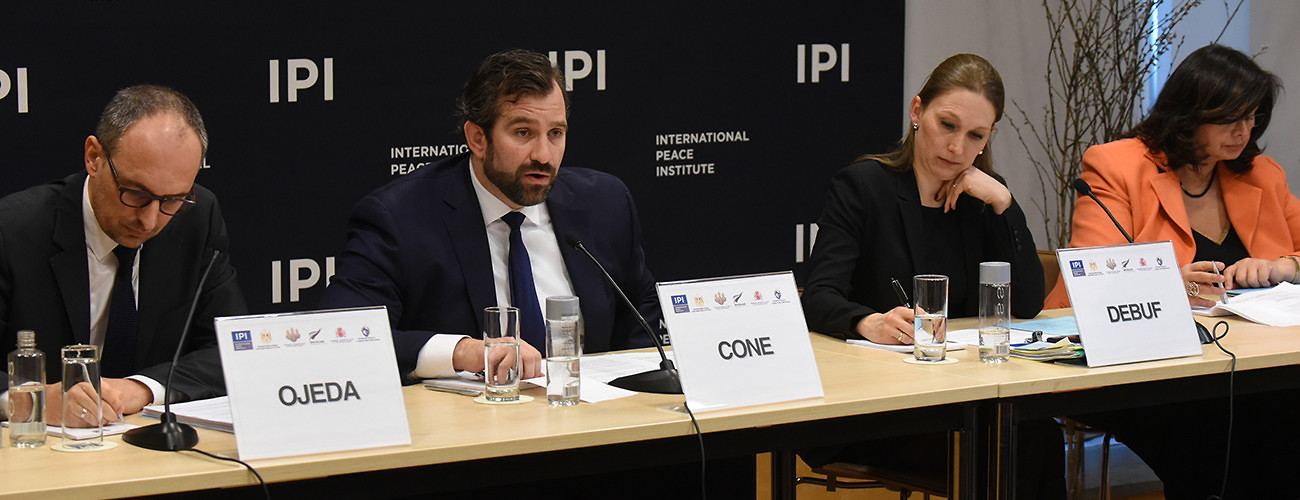Humanitarian experts discussed the international community’s response to the increased frequency and severity of attacks on healthcare infrastructure, transport, personnel, and patients in situations of armed conflict, at an IPI panel April 14, 2016. The discussion was especially timely, as the UN Security Council is considering a draft resolution on healthcare in armed conflict.
The resolution is sponsored by Egypt, Japan, New Zealand, Spain, and Uruguay. Rallying such a diverse group of states around the topic was no easy feat, said Román Oyarzun Marchesi, Permanent Representative of Spain to the UN. “Those of you that are familiar with the Council dynamics will probably agree with me if I call it a small miracle,” he said. “So far we have made it work combining imagination, enthusiasm, and flexibility.”
Encouraged by the Security Council’s work on the subject, Jason Cone, Executive Director, Médecins Sans Frontières, USA, said he hoped that member states will seize this moment to make “public reaffirmations that health facilities must never be a target.” He concluded this call to action to UN members saying, “We cannot accept any criminalization of the medical act.”
He went on to illustrate the spike in violence against even healthcare workers, traditionally understood to be neutral and not legitimate targets. “During the month of October 2015 alone, an MSF trauma center in Kunduz, Afghanistan was bombed, killing 42 staff and patients,” he said. “Twelve hospitals in Syria, including six supported by MSF, were attacked. And an MSF health center in Haydan, Yemen was destroyed.”
“These incidents have a direct and indirect consequence on MSF’s operational capacities and choices, and most importantly our ability to access and treat patients,” he said, lamenting the “unacceptable” choice to cease providing health services as a result of attacks, thereby increasing a conflict’s death toll by depriving many of life-saving medical care.
Stéphane Ojeda, Deputy Permanent Observer to the UN, International Committee of the Red Cross, provided some historical context about the protection of the medical mission—the oldest aspect of the laws of war.
“The protection of the wounded and sick has been at the heart of international humanitarian law (IHL) from the start,” he said. This was the first protected category of the Geneva Conventions, he said, which constituted the norm of treating all sick and wounded, without discrimination or interference, as a keystone of civilized warfare.
Logically, it is impossible to protect the combatant without first protecting medical personnel, he said. “The IHL protection of the wounded and sick would be meaningless without its corollary protection of those taking care of the wounded and sick.”
Ojeda proposed we improve respect for existing international humanitarian law. “We do not need new rules,” he said. “What we need is a better implementation of the existing ones.”
Cone shared concerns about basic protections of international law being overruled by domestic legislation, often written with counter-terrorism as its impetus. “We observe states pushing national counter-terrorism laws or domestic laws, which contradict and often overrule IHL provisions on the protection of the medical mission; we need to see public reaffirmations that health facilities must never be a target.”
He called for improved transparency and accountability in the aftermath of attacks on healthcare facilities. At present, there is often little more than an internal review by the military of the perpetrator, he said. “Whenever an attack occurs, an impartial and independent mechanism should establish the facts,” he said. “States should commit to upholding these standards of fact-finding measures.”
Nata Menabde, Executive Director of the New York Office, World Health Organization (WHO), brought the perspective of the UN to the panel. She explained that a policy prescription must recognize there are both direct and indirect attacks on the healthcare infrastructure, transport, personnel, and patients.
Warfare tactics include obstructing access to health care services for ethnic or political minorities, and intimidating patients from seeking care. “These patients are shot in their beds, medical facilities are looted,” she explained. “That is again, sometimes a part of warfare tactics, not happening by chance, but a tactic.”
Patients are not the only ones intentionally targeted. She also highlighted the punishment of healthcare personnel for the performance of medical duties, such as attacks during the Ebola outbreak, and on polio vaccinators in Nigeria and Pakistan.
Drawing on the examples of current concerns in the field brought to light by her fellow panelists, she said the UN would aim to respond by improving data collection to enable the emergence of evidence-driven solutions. “WHO is committed to improve the standardization of data collection of attacks on healthcare in emergencies, and particularly to better understand consequences of those attacks longer term.”
The event was co-organized with the Permanent Missions of Egypt, Japan, New Zealand, Spain, and Uruguay to the UN.
Els Debuf, IPI Senior Adviser for Humanitarian Affairs, moderated the conversation.








